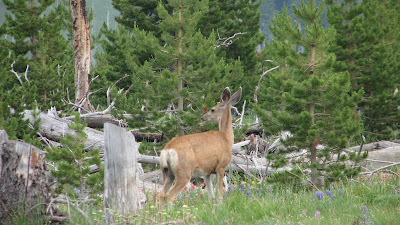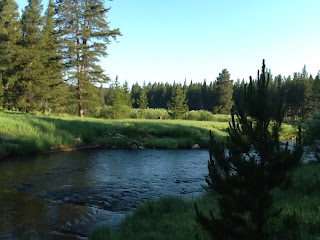"When it's dark enough you can see the stars." Ralph Waldo Emerson
My hair stylist suggests that I get lowlights to highlight my highlights. I've always questioned her wisdom on this because, as far as I'm concerned, I have plenty of low lights. But spending these days in the Bighorn Mountains of Wyoming, I see her point.
I left for this trip on low light, not only because at 4:00 the sun isn't up, but I left feeling the stress of a home full of people and dogs with not a single day alone to prepare for this trip. And I wasn't handling it well. I've been advised by many to HALT when I'm Hungry, Angry, Lonely, Tired. I was all of those the night before my trip, well, with the exception of lonely--I could have used a bit of lonely--but I didn't halt. I was short and impatient.
And so I started this trip in regret and resentment, a surefire damper on the other two r's I was seeking: rest and relaxation.
And speaking of dampers, nothing like a thunder storm my first night to put a damper on my leaky tent and all of its contents, including me. Drip, drip, drip on my feet, either side of me, and a couple of light splashes on my face before the rain finally stops. I sleep lightly trying to avoid the puddles, but, if you've ever been camping, you know how slippery a sleeping bag is. I wake several times in the night and early in the morning, stiff, slipped and damp. What was I thinking? Why don' I have one of those gas guzzling dry RV's that I scoff at?
But after this dismal lowlight, I wake to the sun bedazzling the green pines, the blue sky and contrasting white clouds and hope returns. Everything dries out and I spend the next two sunny, dry days following Prune Creek, on one side the first day, then the other the second day. Both hikes couldn't be more perfect. The snaking river is beautiful and inviting. I take a half bath and sit on a rock to dry until some fishermen approach and I get my pants back on. The valley is green and glorious. I see a marmot and her three babies, the four of us curious and watchful. I watch two people fly fishing on the river while an osprey flies overhead. All this couldn't be more perfect, right? Wrong. Nothing is really touching me like it usually does. I am restless, uncertain, inhibited, indecisive, flat. Should I hop onto those rocks on the river? Should I swim? I'd like to climb those boulders. Nah. Should I eat my sandwich now or save it for a sunny spot? Yeah, yeah, it is all so beautiful. I've seen beautiful. I keep searching for more. It's like eating a bland, unhealthy meal that I overeat to make up for low quality.
Even at my campsite I'm restless and indecisive. I need to go to the trunk to get . . . no, first I should collect some water from the river . . . no I need my dirty pot from the . . . no wait, I should first lock the car . . . the keys are back on the table. Everything takes longer due to indecision, three steps this and two steps another way. This restless searching is a real lowlight. I feel like a failure. I'm not making good use of this trip alone.
Those two R's, resentment and regret are blocking my view.
On the evening of that second hike, after writing in my journal, which I've rarely taken time to do in the past seven months, help arrives. I write about all my frustrations and come to this: Of course I'm in a bad way. I remember two of my friends who helped me with those words: "Of course." The memory of those friends who are on my side and help me see the of course is such a gift. I feel less like a bad person for feeling as I have. I also realize that I hadn't taken much time or space for my relationship with God. For me, God is a space in my heart that I get to in prayer. I thank God for helping me get somewhere this evening. Then I buy a bottle of wine from a smokey bar and have a glass in front of my fire to celebrate my highlight.
The next morning, I feel more restful. I write in my journal:
The stillness of nature is helping me be more still. Robins are singing just like at home, but no one is asking anything of me. On this Independence Day I'm independent, not co-dependent.
That word hits me hard. I'd never thought of myself as co-dependent.
Again I feel like a failure and suddenly I miss my mom. My tears bring me closer to God, closer to my heart, closer to the moment and the world I am in.
I turn to my journal:
Listening, smelling, not looking for, but just looking, all come when I'm still. Thank you, God.
I pack for a hike and take off to climb a hill. Climbing boulders is an adventure. I'm off the beaten path, off any path for that matter, and loving the challenge. Nearly at the top I sit on a boulder and sing the first word of a song, "Listen. Listen God is calling," when right then, the sound of the wind wells up and travels through the lodge poles from left, in front of me and to the right. I listen and I watch. I think it's God telling me I'm in the right place and I'm okay. I cry knowing I'm okay. I love my climb.
.jpeg)
The next morning I wake to an overcast sky, I take a long drive to a dirt road for another long and bumpy ride where signs are scarce. I slow for a deer in the road and she leaps up from all fours and I laugh. I remember as a little girl seeing three deer do that in Wyoming with my family and I giggled and giggled. My mom got such a kick out of my reaction. She'd bring it up from time to time. I find the trailhead and hike three miles to Bucking Mule Falls. All these green hills and suddenly there is a vast valley protected by craggy, enormous rocky cliffs, stanchions serious and complex. A waterfall higher than any I've ever seen is etched out of rocky crevices that don't end. It is so magnificent and I can't take it in. I'm tired on my way back but decide to take another path, thinking it's only a mile to the base of the falls. About a mile in the forest opens up to the small meadow dotted with yellows and pinks and purples and I see a deer the minute she sees me. I gasp. She runs across the path in front of me. I watch and feel it is a special moment. I press on farther until I realize this path is one that goes on another ten miles. I head back, very tired and miss my mom. I remember her saying to me about a year before she died, "I want to live long enough to see how Casey turns out. I want to see how Kate turns out." And I think, or I like to think, she is watching. I cry, "I wish you could help me with Casey, Mom."
This lowlight feels like a highlight. I have this time and space to grieve.
The next morning after sleeping in the car because it rains all night and my tent, well, you know, I write and cry and blow my nose and write and cry some more. I come to a new level of grief. My mom was the person who knew me and understood me, who valued my laughter and my singing and accepted me. I know I have a new loneliness to contend with.
In the evening I walk and whisper, "I wish you were here, Mom." Moments later I see a deer near my campsite. She watches me from a short distance. I watch her. And I think maybe it's my mom. This happens the next morning again. Sure, people see deer all the time, but they don't think it's the spirit of their lost mother. I do. And maybe it sounds hokey to you, but a whole lot of American Indians would disagree. I take comfort when I see a deer and know my mom was a dear.
On this last day in the Bighorn Mountains, I know I have made good use of my time alone. During my last hike I am touched by the beauty around me. I watch and listen and take time to be still. On my way back along a serene lake I gasp. Finally, after six days I see a moose only about forty feet in front of me. He's a big bull moose with a huge set of antlers. He looks at me and I hope I've given him enough space. Okay, you're probably wondering what dead person I think he is. Well, he does have a strong resemblance to my paternal grandmother.
I'm of course grateful for the highlights of this alone time, but I'm also grateful for the lowlights that open me up like the vast valley hidden in the green hills and make space to be touched by the colors, whispers of God and deer.

And now, on my sixth and last morning of camping alone, six days without washing my hair, I emerge from my tent, with lowlights and highlights, dazzling. I am grateful for the wisdom of my hair stylist.
I cooked a delicious camping meal that was even better the second day after marinating in the trunk of the car all day. Of course at home you won't have the troubles I had unsuccessfully balancing a pot on a little butterfly camp stove. You'll also have more spices available to spiff it up. I don't, however, suggest putting it in your trunk for a day.
Tempeh with Mushrooms, Zucchini and Yellow Squash over Orzo
1
/2 onion chopped
1/2 cake of tempeh
small package of crimini mushrooms
1 zucchini, sliced and chopped
1 yellow squash sliced and chopped
l
ots of olive oil
orrzo, cooked in a jet boiler, or just on the stove
salt and pepper to taste
Just cook it all as fast as you can and add anything else you want to cover up the taste of the tempeh, maybe a little tamari would do. If it turns out lousy, trust that this lowlight will be followed by a real highlight of a dinner some other time.
 The
hardest good-bye, of course, was in December when my mom died. It didn’t rock my self-esteem; I don’t feel
leaveable. And I’m trying now to feel
the privilege of knowing my mother, of being raised by her, and of still
learning from her. I know she suffered
in her life and still was able to love and want the best for her kids. She valued our happiness more than anyone
could. I hope I can learn to be that
kind of mother.
The
hardest good-bye, of course, was in December when my mom died. It didn’t rock my self-esteem; I don’t feel
leaveable. And I’m trying now to feel
the privilege of knowing my mother, of being raised by her, and of still
learning from her. I know she suffered
in her life and still was able to love and want the best for her kids. She valued our happiness more than anyone
could. I hope I can learn to be that
kind of mother.



.jpeg)




